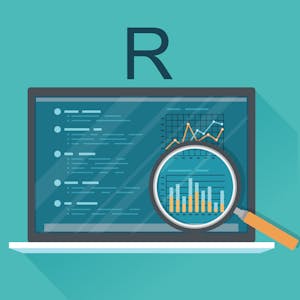Data Analysis with R
The R programming language is purpose-built for data analysis. R is the key that opens the door between the problems that you want to solve with data and the answers you need to meet your objectives. This course starts with a question and then walks you through the process of answering it through data. You will first learn important techniques for preparing (or wrangling) your data for analysis. You will then learn how to gain a better understanding of your data through exploratory data analysis, helping you to summarize your data and identify relevant relationships between variables that can lead to insights. Once your data is ready to analyze, you will learn how to develop your model and evaluate and tune its performance. By following this process, you can be sure that your data analysis performs to the standards that you have set, and you can have confidence in the results. You will build hands-on experience by playing the role of a data analyst who is analyzing airline departure and arrival data to predict flight delays. Using an Airline Reporting Carrier On-Time Performance Dataset, you will practice reading data files, preprocessing data, creating models, improving models, and evaluating them to ultimately choose the best model.
Watch the videos, work through the labs, and add to your portfolio. Good luck!
Note: The pre-requisite for this course is basic R programming skills. For example, ensure that you have completed a course like Introduction to R Programming for Data Science from IBM.
Prepare data for analysis by handling missing values, formatting and normalizing data, binning, and turning categorical values into numeric values.
Compare and contrast predictive models using simple linear, multiple linear, and polynomial regression methods.
Examine data using descriptive statistics, data grouping, analysis of variance (ANOVA), and correlation statistics.
Evaluate a model for overfitting and underfitting conditions and tune its performance using regularization and grid search.
Syllabus
Syllabus - What you will learn from this course
Week 1
Introduction to Data Analysis with R
Week 2
Data Wrangling
Week 3
Exploratory Data Analysis
Week 4
Model Development in R
Week 5
Model Evaluation
Week 6
Project
FAQ
When will I have access to the lectures and assignments?
Access to lectures and assignments depends on your type of enrollment. If you take a course in audit mode, you will be able to see most course materials for free. To access graded assignments and to earn a Certificate, you will need to purchase the Certificate experience, during or after your audit. If you don't see the audit option:
The course may not offer an audit option. You can try a Free Trial instead, or apply for Financial Aid.
The course may offer 'Full Course, No Certificate' instead. This option lets you see all course materials, submit required assessments, and get a final grade. This also means that you will not be able to purchase a Certificate experience.
What will I get if I subscribe to this Certificate?
When you enroll in the course, you get access to all of the courses in the Certificate, and you earn a certificate when you complete the work. Your electronic Certificate will be added to your Accomplishments page - from there, you can print your Certificate or add it to your LinkedIn profile. If you only want to read and view the course content, you can audit the course for free.
Reviews
It is excellent course. I recommend for all that do not have a lot of knowledge and experience in data analysis with R Programming. Thank you for this opportunity.
I could not use WatsonStudio and used RStudio instead. It might have caused problems to the reviewers of peer assignment. Course content is good.
One of the best courses for learning R programming and data analysis.
Excellent content, very easy to coorealate with the practical world.
